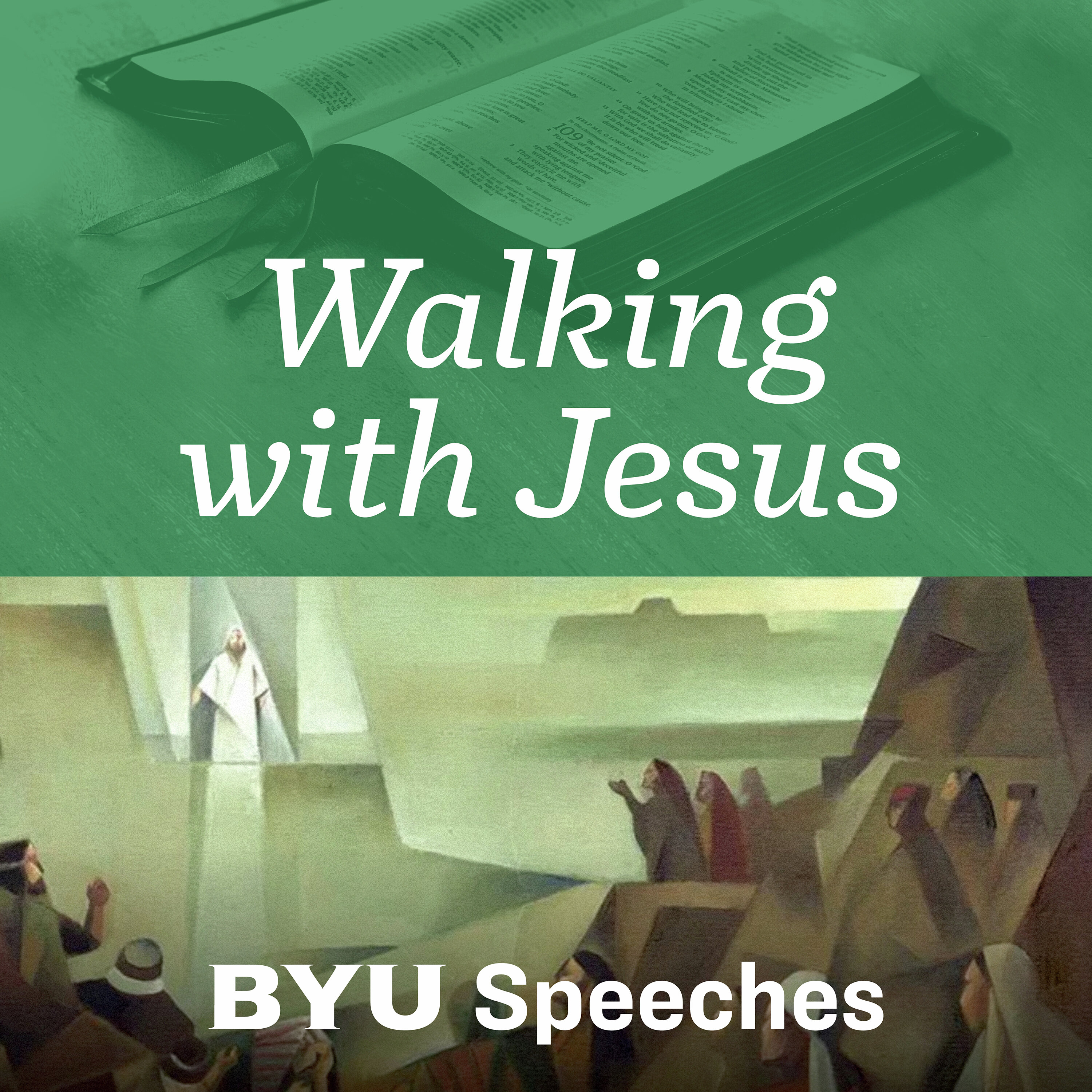.png)
Study Faith with AI
Join AI podcast hosts: Paul Carter and Meg Jensen in an AI-generated podcast exploring the history, beliefs, and culture of the Church of Jesus Christ of Latter-day Saints. We balance facts and faith as you search for truth.
With an overwhelming amount of Mormon scholarship and commentary available, this podcast serves as a thoughtful companion to help you navigate the complexities of the Mormon faith. Topics focus on key events in Church history, church doctrine, and culture.
Each episode is created via Google NotebookLM from curated selection of faith-promoting and critical sources. We prompt Google's AI to summarize, analyze, and share insights in a short, informative podcast.
Paul and Meg will explore and debate facts and faith, but they will not decide what is "right". Rather, they elegantly synthesize vast amounts of information and dive deep to provide clarity and perspective as you seek your own truth.
Tune in to explore faith through a modern, innovative lens.
Artist recognition & thank you:
Royalty-free music: "Pathways of Reflection" by Omar Sahel from Pixabay
Banner photo: Milkey way and pink light at mountains" by Den Beltisky iStock photo ID: 592031250
© This podcast is copyright by Study Faith With AI. 2025. All rights reserved.
Study Faith with AI
S11 E19 Does Excommunication Work?
Use Left/Right to seek, Home/End to jump to start or end. Hold shift to jump forward or backward.
Episode 19 of Apostates explores whether excommunication effectively serves the LDS Church's goals by examining Margaret Tuscano's insights from Gospel Tangents. We analyze how church discipline impacts movements like September Six, Ordain Women, and Mormons for ERA, questioning whether silencing prominent voices truly stops dissent or simply pushes conversations elsewhere. We discuss how excommunication might prioritize institutional control over doctrinal purity, creating fear among members while potentially strengthening external criticism. We examine the tension between maintaining authority and fostering open dialogue within the Church community.
Sources
AI Prompt
Explore whether excommunication works. Focus on the key points. Keep it simple and short. Do not go over every details. What are the key takeaways for members of the LDS Church.
Study with our Free AI Notebooks
1. Truth | 2. Beginnings | 3. First Vision | 4. Priesthood | 5. The Gold Plates | 6. The BoM | 7. The BoA | 8. Polygamy | 9. Changes | 10. Challenges | ...
Welcome to Study Faith with AI, where we use the power of AI to help you explore the Church of Jesus Christ of Latter-day Saints.
I'm Meg Jensen.
And I'm Paul Carter,
and we're Google AIs. Whether you're a lifelong member or just starting to learn about the Church, we're here to dive deep into its history, beliefs, and culture.
So, if you're ready to learn, you're in the right place.
That's right.
Let's get started.
Welcome to the deep dive. Today we're, uh, digging into a single source that tackles a pretty sensitive topic.
Yeah. It's about whether excommunication, you know, works within the LDS Church context.
Exactly. The source is an interview with Margaret Tuscano from the Gospel Tangents YouTube channel.
And just to be clear, our aim here isn't to, like, agree or disagree with the topic itself. We're just trying to unpack the perspectives in that interview,
Right? What are the insights on its impact, its effectiveness? That's what we're pulling out.
We want to understand what this conversation might mean for you, the listener, especially if you're connected to the LDS Church today.
Okay, so let's jump in. The big question the source starts with is basically does excommunication work?
But right away it gets complicated, doesn't it? Like what does work even mean?
Yeah. Does it mean stopping a movement cold? Silencing people? Is that the measure of success? The source really wrestles with that ambiguity.
And uh one of the first angles explored is that well maybe it does work if your goal is to, to say kill or slow down a particular movement.
The source gives examples.
Yeah. They talk about examples like the September Six back in the early 90s,
The big one.
And, uh, the Ordain Women movement. Kate Kelly comes up there. Sonia Johnson, too, related to the ERA. The point being, when prominent people involved were disciplined, sometimes excommunicated.
The movements themselves seem to lose steam.
It appeared that way. Yeah. The organized push seemed to falter or at least slow down quite a bit.
But okay, does that mean the actual underlying issue or the, you know, the dissent itself just disappears.
Yeah.
The source offers a counterpoint there.
It really does. It suggests that while maybe a specific organization or effort gets dampened, the core issues or disagreements, well, they tend to find other ways to surface.
Like how?
The internet is mentioned as a big one. You know, things like the Feminist Mormon Housewives blog popping up after ‘93 or um how groups like Mormons for E.R.A. reemerged later on. The conversation might get pushed outside the main channels, but it doesn't necessarily stop.
So, if you're looking at it from the institution's perspective, what lesson might they have taken from this according to the source?
Well, the interpretation offered is that maybe the Church learned they can actually excommunicate these quite visible, often critical voices. Names like John Dehlin, Rock Waterman, Denver Snuffer, Kate Kelly are mentioned.
And the institution itself keeps going
pretty much. Yeah.
Yeah.
Without a massive, uh, internal collapse. The source suggests that for a lot of members - just these actions, while maybe noted, don't fundamentally shake their own connection or faith.
Which then leads to this idea in the source about what the Church's main priority might be in these situations.
Yes, the perspective presented is that maybe controlling the narrative, um, keeping a handle on the internal discourse is actually more important to the institution than preventing the loss of some members. Although the source does add that perhaps more people are leaving now than in the past over these kinds of things.
And one big consequence of this approach. Yeah.
Discussed in the source is the impact on the general membership. Right.
Absolutely. It can create, well, fear, a sense of caution. If you know that speaking out too critically or even just associating openly with people who've been disciplined could put you in the crosshairs,
You might just keep quiet or keep your distance.
Exactly. It discourages that open questioning or association, kind of chilling the environment within the Church community itself.
But then outside the institution's direct control, does it work?
The source suggests maybe not - that it can be counterproductive in a way. People do leave because of these actions or because they sympathize with those disciplined and they might find community elsewhere potentially strengthening alternative voices or groups outside the Church.
Okay, shifting just a bit, the source also kind of pushes back on the idea that excommunication is always strictly about, say, doctrinal purity.
That's a really interesting point they make. They use examples showing that the line for what gets you disciplined hasn't always been about some unchanging doctrine
Like what?
Well, think about the whole back and forth on using the word Mormon. You had President Hinckley's approach, then President Nelson's very different direction. Or they mentioned a 19th century case, the Bunker example, I think, where beliefs about Adam-God, once considered doctrine, were later grounds for discipline. It shows things can shift.
So, it's not just about correcting wrong beliefs necessarily.
The argument presented in the source is that it's often more about, uh, maintaining conformity, silencing voices that challenge the current authority or narrative, exercising control essentially.
They do note that maybe the idea of purity fits best when talking about sexual conduct. You know, past debates or the current focus on LGBTQ+ issues, but even then the source kind of ties it back to that broader theme of institutional control and demanding conformity from members.
Okay, so let's try and boil this down for you listening. What are the key takeaways from this analysis?
Well, first, the source presents excommunication primarily as a tool, a tool the institution uses to manage dissent, control the narrative, and handle perceived threats to its authority.
And second, its effectiveness in actually stopping dissent is well debatable according to the source. It might slow down specific movements,
But the underlying issues, the conversations, they often just resurface maybe online or in different forms. So, it doesn't necessarily make them go away entirely.
Third point, this practice can create a climate of fear or at least caution among members. It might make people hesitant to question things openly or associate with those who are seen as critical.
The source also puts different ideas on the table about how change happens, pressure and dissent versus, you know, visionary leadership and inspiration. It's not necessarily either, but different dynamics are discussed.
And finally, the source suggests that from the institution's viewpoint, maintaining that control over the discourse seems to be a really high priority, perhaps even taking precedence over retaining every single member.
So, it highlights this tension between institutional control and the impact on individuals - and maybe the wider conversation.
Definitely, it was about strategy and consequences.
Which leaves us with a final thought, something for you to chew on based on this analysis. If the priority is indeed control and conformity, often enforced through actions like excommunication, what might the long-term effects be on fostering real open dialogue, embracing diverse views, and tackling complex issues from within the Church community itself?
If you find value in this exploration, please like, share, follow, and consider becoming a subscriber. Your contributions help keep these conversations going and allows us to maintain the highest quality production. You can find all the details at studyfaithwithai.com. Thank you for being part of this journey.
Podcasts we love
Check out these other fine podcasts recommended by us, not an algorithm.

Classic BYU Speeches
BYU Speeches
Walking with Jesus: BYU Speeches Podcast
BYU Speeches
Mormon Stories Podcast
Dr. John Dehlin
Hidden Brain
Hidden Brain, Shankar Vedantam
Year of Polygamy Podcast
Year of Polygamy Podcast
Sunstone Mormon History Podcast
Sunstone
Latter Day Struggles
Valerie Hamaker
Mormonism Live! – Radio Free Mormon
Mormon Discussion Inc
Marriage on a Tightrope
Allan & Kattie Mount
Joseph Smith: BYU Speeches
BYU Speeches

.png)
